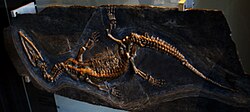| Ceresiosaurus Temporal range: Middle Triassic,
| |
|---|---|

| |
| Ceresiosaurus calcagnii fossil | |
| Scientific classification | |
| Domain: | Eukaryota |
| Kingdom: | Animalia |
| Phylum: | Chordata |
| Class: | Reptilia |
| Superorder: | †Sauropterygia |
| Order: | †Nothosauroidea |
| Family: | †Nothosauridae |
| Subfamily: | †Lariosaurinae |
| Genus: | †Ceresiosaurus Peyer, 1931 |
| Type species | |
| †Ceresiosaurus calcagnii Peyer, 1931
| |
| Species | |
Ceresiosaurus is an extinct aquatic genus of lariosaurine nothosaurid sauropterygian known from the Middle Triassic (Anisian-Ladinian boundary) of Monte San Giorgio, southern Switzerland and northern Italy. Ceresiosaurus, meaning "Lizard of Ceresio" (Ceresio is the name of the Lake Lugano, in Switzerland). The type species, Ceresiosaurus calcagnii, was named by Bernhard Peyer in 1931. C. calcagnii is known from both the Cava superiore and Cava inferiore beds of the Lower Meride Limestone at Monte San Giorgio, dating to the latest Anisian of the Middle Triassic.[1] Rieppel (1998) suggested that the back then monospecific genus Ceresiosaurus, is a junior synonym of the better known Lariosaurus, yet he kept it type species as a separate species under the new combination L. calcagnii.[2] In 2004, however, this synonymy was objected by Hänni who described and name a second species of Ceresiosaurus, C. lanzi - a separation supported by several other authors since. This species is known only from the stratigraphically younger Cassima beds of Monte San Giorgio, although also from the Lower Meride Limestone, dating to possibly the lowest Ladinian age. The species in a subtropical lagoonal environment with varying open marine influences, and alongside many related but smaller species of nothosaurids and pachypleurosaurids. Ceresiosaurus represents one of the largest vertebrate of up to 3 m (9.8 ft) snout-tail length from the very diversified paleoenvironment of the Middle Triassic Monte San Giorgio.[1]
- ^ a b Hugi, Jasmina (October 2011). "The long bone histology of Ceresiosaurus (Sauropterygia, Reptilia) in comparison to other eosauropterygians from the Middle Triassic of Monte San Giorgio (Switzerland/Italy)" (PDF). Swiss Journal of Palaeontology. 130 (2): 297–306. Bibcode:2011SwJP..130..297H. doi:10.1007/s13358-011-0023-6. S2CID 128688930.
- ^ Rieppel, Olivier (1998). "The status of the sauropterygian reptile genera Ceresiosaurus, Lariosaurus, and Silvestrosaurus from the Middle Triassic of Europe". Fieldiana: Geology. New Series. 38: 1–46.